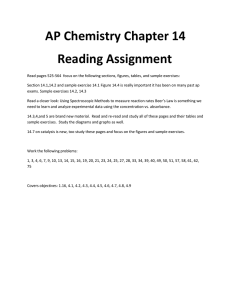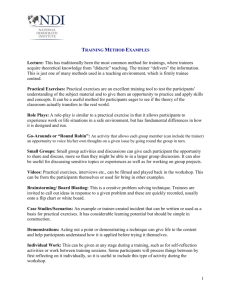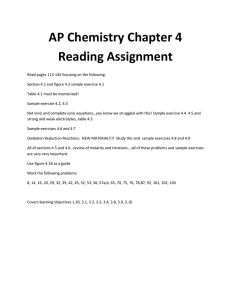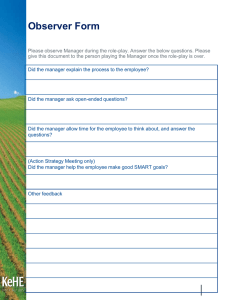Setting your benchmarks
advertisement
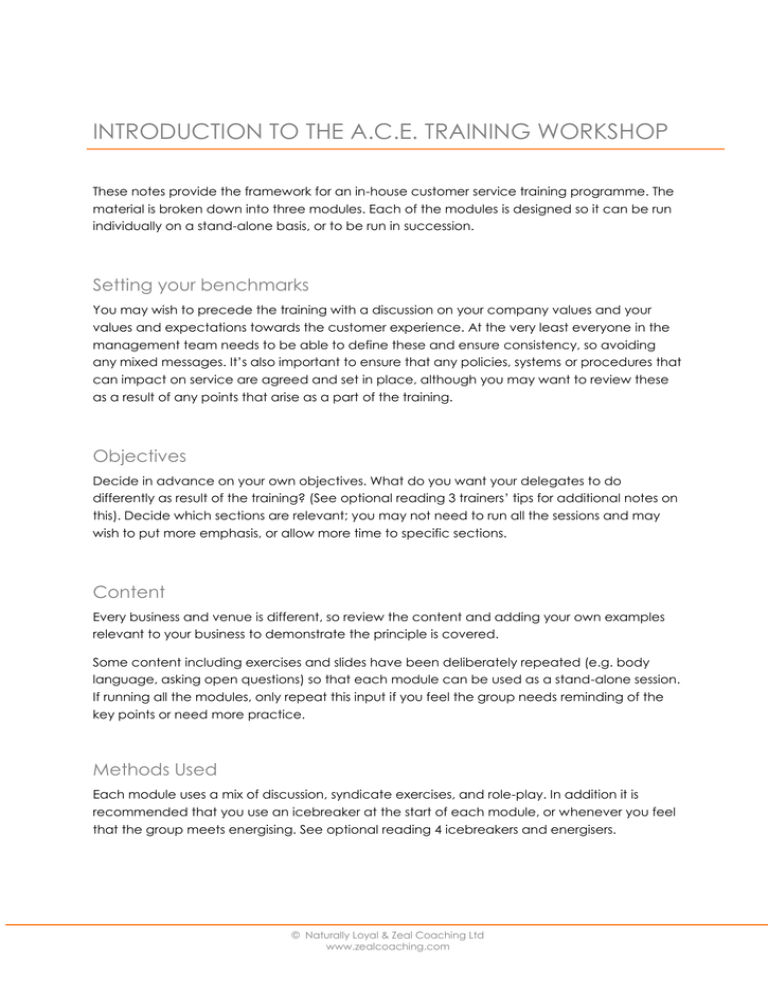
INTRODUCTION TO THE A.C.E. TRAINING WORKSHOP These notes provide the framework for an in-house customer service training programme. The material is broken down into three modules. Each of the modules is designed so it can be run individually on a stand-alone basis, or to be run in succession. Setting your benchmarks You may wish to precede the training with a discussion on your company values and your values and expectations towards the customer experience. At the very least everyone in the management team needs to be able to define these and ensure consistency, so avoiding any mixed messages. It’s also important to ensure that any policies, systems or procedures that can impact on service are agreed and set in place, although you may want to review these as a result of any points that arise as a part of the training. Objectives Decide in advance on your own objectives. What do you want your delegates to do differently as result of the training? (See optional reading 3 trainers’ tips for additional notes on this). Decide which sections are relevant; you may not need to run all the sessions and may wish to put more emphasis, or allow more time to specific sections. Content Every business and venue is different, so review the content and adding your own examples relevant to your business to demonstrate the principle is covered. Some content including exercises and slides have been deliberately repeated (e.g. body language, asking open questions) so that each module can be used as a stand-alone session. If running all the modules, only repeat this input if you feel the group needs reminding of the key points or need more practice. Methods Used Each module uses a mix of discussion, syndicate exercises, and role-play. In addition it is recommended that you use an icebreaker at the start of each module, or whenever you feel that the group meets energising. See optional reading 4 icebreakers and energisers. © Naturally Loyal & Zeal Coaching Ltd www.zealcoaching.com Role-plays There are some role-play briefing sheets provided as examples only. Please note these will need to be written or adapted to suit your business and your specific situations and seasonal variations. The more relevant they are to your own business the greater the impact and engagement you will gain from your team. So ensure sufficient time is devoted to preparing these before you commence the training. Timings All the timings are approximate and will be dependent on the interaction within the group, and how much time you devote to questions and exercises. Suggested minimum timings are given in brackets but you may want to devote longer discussion on points that are key in your business and depending on your objectives. Resources Needed As a minimum and you will require the following for each of the sessions: Flipchart and pens A clock or timer to keep a check on timings of exercises handouts as specified for each session projector and computer if using the PowerPoint slides In addition some sessions will require relevant props as well as Blu Tack Post-it notes PowerPoint slides A PowerPoint presentation is included in the pack. This has a blank background so that you can add your own branding if you wish. You may wish to add slides to illustrate specific points relevant to your business. For this reason slide numbers have not been given in the notes, as these would then be out of sync. I would recommend all the slides read correctly for your programmes. Some fonts may need changing if your computer does not read them correctly. Terminology The term customer is used throughout to cover guests, visitors, delegates, etc. Use whatever term you generally use in your business. You may need to tailor some handouts and slides accordingly © Naturally Loyal & Zeal Coaching Ltd www.zealcoaching.com
